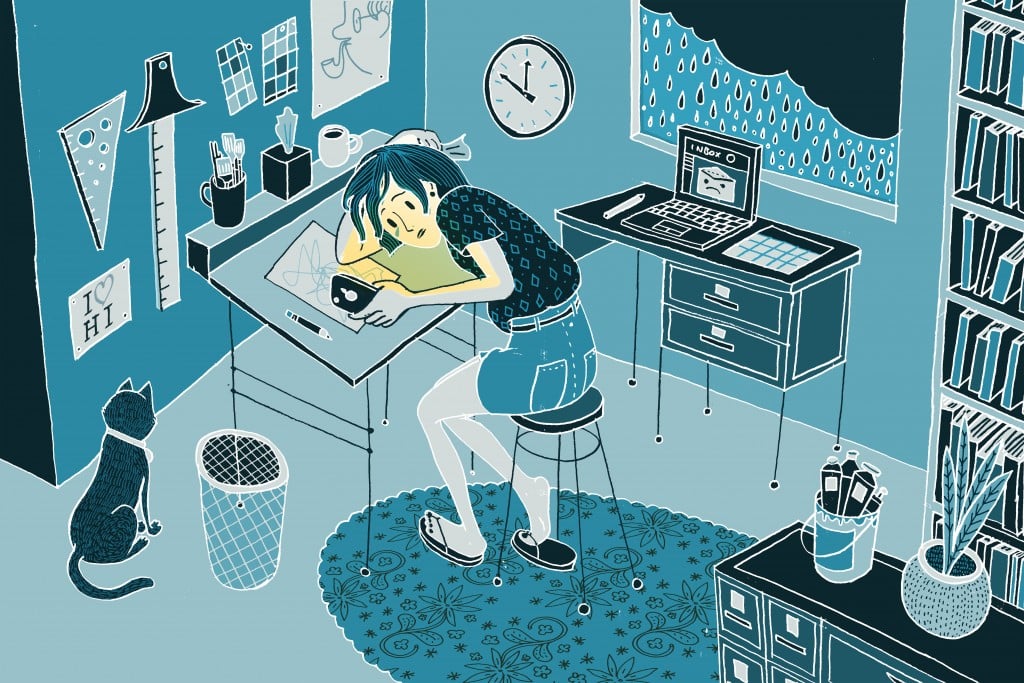The Careerist: Are We Never Ever Getting Back Together?

Q: I’m a freelance graphic arts designer who is completely baffled. One of my best clients has gone radio silent, ghosting me without even so much as a “I’m just not that into you.” I’ve done all the standard stuff – follow-up calls and emails – and nada. They’ve always loved my work, paid me without delay and have been quick to bring me in on new projects. Do I cut and run, pester them until they fire me for good, or just leave the ghost in the closet and hope they come back one day?
A: Getting dumped never gets easy, does it? But, sometimes, particularly when it’s work related, it’s really not all about you. I took your question to Communications Pacific CEO Kitty Lagareta who, while not a one-woman freelancer, knows a thing or two about keeping clients happy and engaged. She points out that, by its very nature, your work is likely project driven, and sometimes clients simply step away between projects. Or maybe something else happened, like the boss’s kid graduated from college and is now doing all their graphic design work. Ouch, I know, but Lagareta swears something like that happened to her once.
Lagareta advises keeping the conversation going (preferably before they ghost you) and keep up with their business, even before they pull you into the project. “It’s also important to remember that whomever you’re working with is having to justify the cost to their boss,” she says, “So we always try to make sure the client feels they’re getting a good value, that we know and understand their business.”
When all else fails, the calls go unreturned and the emails unanswered, Lagareta advises leaving on a high note. “Send a hand-written note to thank them for all the work you’ve done together and tell them what a joy they’ve been to work with.” Will you get the client back? Who knows? But at least it won’t be so awkward when you run into them at Costco.
Q: I love my new job, but this bullpen lifestyle may kill me! With a staff of almost 50, there’s always a birthday party or work anniversary to celebrate, and then there are the pau hana farewells. And don’t even get me started about all the chitchat between desks! How am I supposed to get work done?
A: Don’t you know the bullpen was the big idea of a guy sitting in his cushy private office with a windowless door and natural light filtering in through big windows? Between the odors from everyone’s lunch, the informal gatherings and the awkwardness of hearing phone conversations you’d rather not, space planners are questioning whether the grand idea of collaborative workplaces was so grand after all. Two studies – one by researchers at Cornell University and the other from the University of Sydney – both found the lack of sound privacy is the biggest killer to productivity and employee satisfaction in open offices.
Since Hawaii Business recently moved to an open office, I asked my colleagues for tips. Top on the list: noise-canceling headphones. Everyone has them and everyone knows to stay away when the ears are plugged in. Other suggestions include taking coffee breaks to get alone time, and letting colleagues know you’re on a deadline. “It’s important to know each other’s schedules, and when they’re on deadline, we stay away,” HB’s Anela Apostadiro says.
At HMSA, where they know a bit about workplace wellness, the open-office dwellers offer other tips. “One department does one-minute healthy activities at the top of the hour, like stretches, jumping jacks or running in place,” Robyn Kuraoka reports. “Some folks were shy at first, but now almost 50 percent stand up, participate and have fun, managers included.” HMSA’s folks also suggest redirecting the casual banter to whatever project you’re working on, soliciting feedback and opinions –actually collaborating as was originally envisioned. You’ll likely get some good ideas, and you’ll definitely deter those looking to kill time.
Still too much? At Quiet Revolution, an organization dedicated to introverts, Elan Morgan might have the best suggestion. “Book a small meeting room, but don’t invite anyone else,” she suggests.
Q: I’ve been doing seasonal work with a nonprofit for the last few years, and recently it’s gotten hard to get paid. I never get my check when it’s due, and even after my boss relinquishes it, she asks me to hold it for a few days, until she gives the all-clear. I like the organization and the work, but I’ve got rent to pay. Any advice?
A: Yikes! I hate to break it to you, but sounds to me like you might be a volunteer. It’s true that federal law prohibits employers from withholding employees’ paychecks for any reason. The thing is, as a seasonal worker, you may be a contractor, not an employee, and if that’s the case, the rules are less clear.
Everyone deserves to be paid on time, but cash flow is real too, and sometimes there’s a pecking order. You’ve been there, right – maybe paying the rent and begging your roommate to hold on a bit before repaying that money she spotted you for groceries? Especially for startups and nonprofits, cash flow is sometimes a struggle, and it sounds like your boss is doing her share of juggling.
I turned to Honolulu Theatre for Youth’s managing director Becky Dunning for insight. As one of Hawaii’s most beloved nonprofits, HTY knows the show must go on, regardless of the juggling backstage. “We’re fortunate that, over the last five years or so, things have been really good for us,” she says. “But in the past there were times when we counted every penny and timed payments to make sure there was money in the bank to cover them.” Dunning points out that, with HTY’s contract workers – set designers, costume makers and the like – they have clear, written agreements outlining the payment schedule, and contractors understand in advance when they’ll be paid, in what increments, and what’s expected of them to earn those payments.
Assuming you don’t have such an agreement, Dunning’s counsel is this: “Before taking on more work, get a written agreement with the organization and let your boss know you expect her to stick to it.” Include in that agreement specific payment dates for the money owed you already, establishing those with your boss so you move up the payment ladder.
Like so much in life, try working it out before stomping off mad. Chances are you’ll get paid. If you don’t, take it as a sign these folks may go under, and you need a paying gig before the rent comes due again.
Have a question about work, life and that place in the middle where it all gets tangled up? Ask me at: feedback@hawaiibusiness.com






